Medical expert of the article
New publications
Nasal allergy spray
Last reviewed: 04.07.2025

All iLive content is medically reviewed or fact checked to ensure as much factual accuracy as possible.
We have strict sourcing guidelines and only link to reputable media sites, academic research institutions and, whenever possible, medically peer reviewed studies. Note that the numbers in parentheses ([1], [2], etc.) are clickable links to these studies.
If you feel that any of our content is inaccurate, out-of-date, or otherwise questionable, please select it and press Ctrl + Enter.
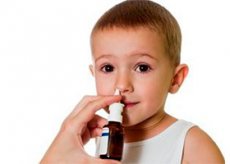
Allergy nasal spray is one of the effective forms of the drug, created to combat various types of allergies. First of all, this form was created by pharmacologists for patients suffering from allergic rhinitis. This is an easy-to-use and easy-to-carry product, it can be easily placed in a pocket or a woman's bag.
Nasal allergy remedy is a fast-acting medicine, because the active substances of the drug are locally concentrated in the nasal cavity, where they should act. Also, when introducing the allergy spray into the nose, a very small number of side effects of the drug are recorded. Also, the spray can be used frequently or during exacerbations.
Disadvantages of nasal sprays include the formation of crusts in the nose and, rarely, bleeding. Individual intolerance to the components of the drug is also possible.
Modern nasal allergy sprays are classified into:
- Antihistamines - begin their action within 10-15 minutes after use, are excellent for mild to moderate forms of the disease.
- Gel-forming - a new generation of allergy spray, creating a thin gel in the nasal cavity, prevents allergens from entering the bloodstream and also protects the cavity itself, which promotes the gradual removal of harmful substances from the body.
- Hormonal sprays for allergies are used in severe cases and block the main sources of allergic reactions.
- Anticholinergics - reduce watery nasal discharge, most often used in combination with medications to eliminate allergies. A feeling of dryness in the nose and an increase in intraocular pressure of varying degrees are possible side effects when using drugs of this nature.
- Cromones - the main component is cromoglycic acid, which acts very slowly and for a short time. After using cromones, headaches, dry nose, and loss of taste may occur.
 [ 1 ]
[ 1 ]
Avamys
A local decongestant drug used for diseases of the nasal cavity and for the systematic treatment of allergic rhinitis.
Pharmacodynamics – fluticasone furoate, the main component of the drug, is a synthetic corticosteroid with a high anti-inflammatory effect.
Pharmacokinetics – the components of the drug undergo extensive metabolism in liver cells and are actively excreted through the intestines with feces.
Method of administration and dosage: adults and children over 12 years of age can use 2 sprays in each nostril once a day. Children 6-11 years old - one spray each.
Contraindications for use: individual sensitivity to the active components of the spray.
Side effects: possible occurrence of ulcers in the nasal cavity, pain in the head, bleeding from the nose.
Pregnant and lactating women are contraindicated to use the drug.
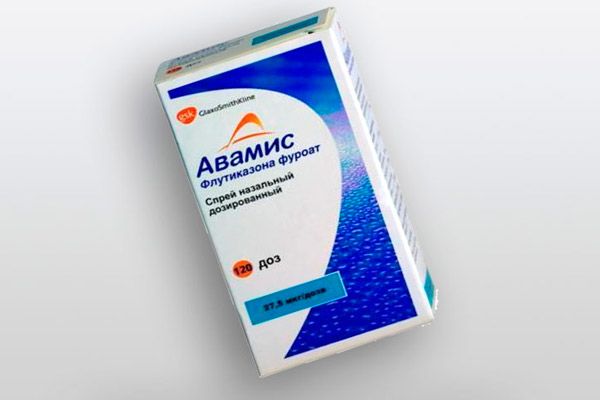
The shelf life is 3 years, after opening the bottle - 2 months.
 [ 2 ]
[ 2 ]
Nasonex
A medicinal product for the treatment of diseases of the nasal cavity.
Pharmacodynamics: mometasone furoate is a synthetically produced corticosteroid for topical use with anti-inflammatory action.
Pharmacokinetics – when using a nasal spray, it has very low bioavailability (less than 0.1%) and is almost not detected in blood plasma.
Contraindications for use: therapy of seasonal or permanent rhinitis in adults and also children from 2 years of age, prevention of allergic rhinitis, additional therapeutic drug in antibiotic therapy of acute sinusitis in children over 12 years of age and adult patients, also for nasal polyps and their symptoms.
Method of administration and dosage - for systematic or seasonal therapy of allergic rhinitis, Nasonex is used 2 sprays once a day in each nasal passage for adults and children who are already 11 years old. Children from 2 to 10 years old are given one spray once a day.
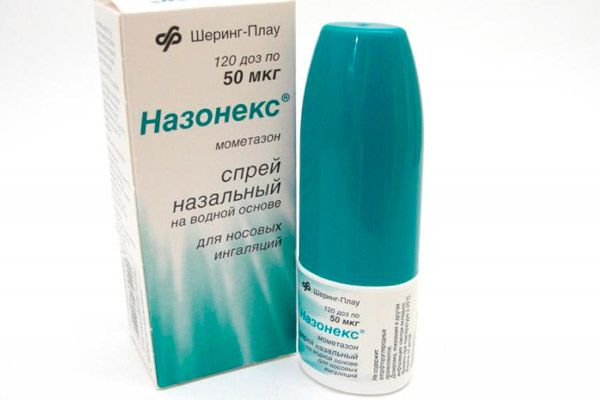
Side effects include headaches, migraines, nosebleeds, pharyngitis, a burning sensation in the nose, extremely rare allergic reactions to the medication, and isolated cases of taste and smell disorders.
It is not recommended to use the drug in case of personal intolerance to the components.
Store the medicine at a temperature of 2 to 25 degrees, freezing is not recommended. Shelf life is 3 years. Sold only by prescription.
Prevalin
A non-hormonal allergy spray that is effective in treating rhinitis. The active ingredients of the drug block the action of allergens, thereby reducing the manifestations of rhinitis. Prevalin acts directly in the nasal cavity, forming a gel film on the walls, thereby preventing allergens from entering.
The drug is used only intranasally in each nasal passage, 1-2 sprays, 2-3 times a day.
Among the secondary effects, nasal congestion is likely immediately after application.
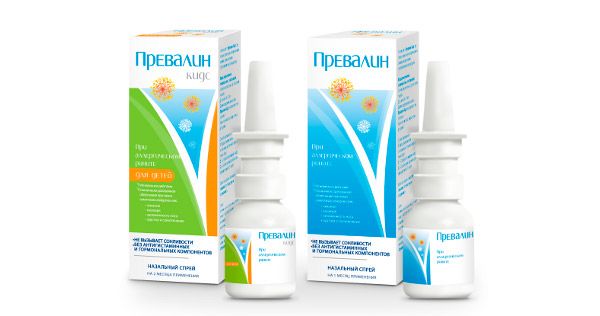
It is not recommended to use the spray for children under 6 years of age and in case of personal intolerance to the components of the drug. It is not prohibited for use by pregnant women.
When using Prevalin with other medications, use as a last resort.
Store at 15-25°C, use an opened bottle of medicine for no more than three months.
Flixonase
A drug for the treatment of nasal cavity diseases, decongestant.
Indications for use: for the treatment of persistent and seasonal rhinitis, including hay fever.
Contraindications for use: hypersensitivity to the components of the drug.
Method of administration and dosage: for adults and children aged 12 and over, it is recommended to spray 2 times a day into each nasal passage in the morning, after cleaning it first. For children aged 4 to 11, spray 1 time per day.
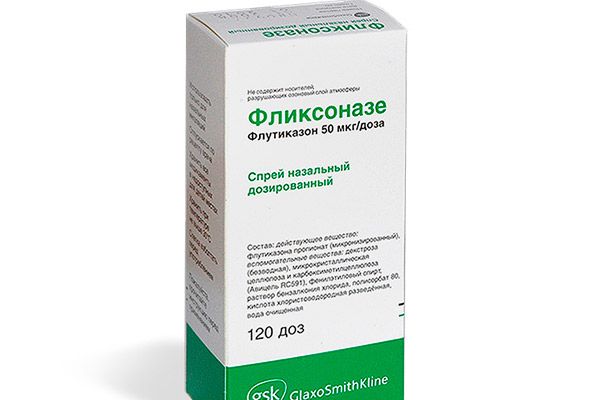
Side effects include headaches, migraines, unpleasant taste in the mouth, nosebleeds, a feeling of dryness in the nasal cavity and throat, and isolated cases of increased intraocular pressure.
In case of overdose, a temporary decrease in the functional activity of the adrenal glands is possible, which goes away on its own after discontinuing the use of the drug.
It is not recommended to use Flixonase during pregnancy and breastfeeding.
Shelf life is 3 years.
Cromoghexal
A nasal spray used to treat year-round and seasonal allergic rhinitis.
Use one spray up to 4 times daily for each nostril.
Minor side effects may include hives, nausea, irritation or burning sensation in the nasal cavity, coughing, sneezing, swelling of the lips or eyelids, and an unpleasant taste in the mouth.
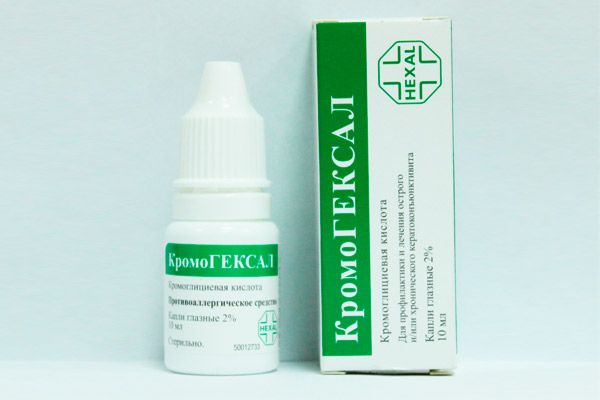
The use of Cromoghexal is contraindicated during pregnancy and breastfeeding, in case of allergic reactions to the active components of the drug, as well as for children who have not yet reached 5 years of age. With caution, take those who have polyps in the nasal cavity, patients with renal and hepatic insufficiency.
Shelf life is 3 years. Once opened, use the medicine bottle within 6 weeks.
 [ 5 ]
[ 5 ]
Nazaval
A systemic nasal spray that settles on the walls of the nasal cavity in a gel form and thus protects it from the action of various types of allergens. The active component of the drug is micronized cellulose and mint extract.
Effective in cases of allergic reactions to flowering, dust, chemicals, fungal components, epidermal components of domestic animals and birds.
It is recommended to use the spray 10-15 minutes before possible contact with the allergen. Nazaval can be used an unlimited number of times.
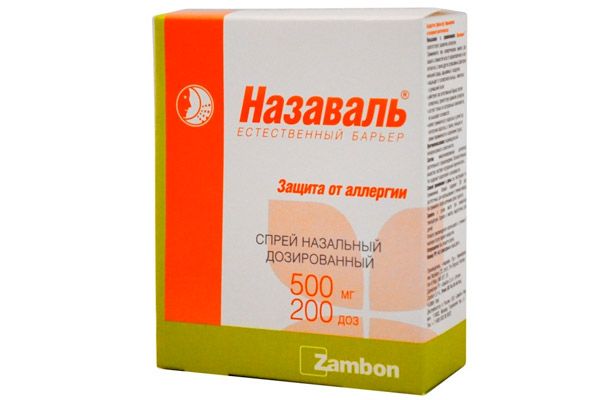
This drug is safe to use during pregnancy and from the first days of a child’s life.
Nazaval is contraindicated in patients sensitive to cellulose and mint extract.
Since the components of the drug do not enter the bloodstream, no side effects of the medication have been noted.
There are no cases of overdose with nasal allergy spray, because the active substances do not enter the bloodstream.
Nazaval prevents the penetration of other nasal sprays by creating a gel film on the nasal mucosa.
Allergy nasal spray is the main medicine for many people that helps fight this disease. However, self-medication is not recommended, but you need to see a doctor to get tested and determine what type of allergy you have and fight it in a comprehensive and correct manner.

